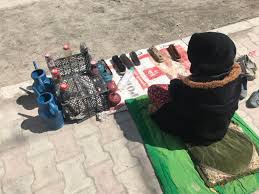Zahra Rashidi
The child is young, but she has taken on the responsibility of providing for her family like adults. At twelve years old, she is in the second grade. However, unaware of the future, she spends half of her day working outside the home.
In the street where Mezhgan is busy polishing shoes, one can see children (both girls and boys) engaged in street work. Mezhgan and other children working alongside her are typically busy with street work from early morning until around seven in the evening, pushed into the streets by various factors, seeking bread. In this report, you’ll read why Mezhgan has become a victim of street work.
Mezhgan works on one of the streets in the fourth district of Kabul city. When asked about her place of residence, she says she lives in this area. According to her, they live in one of the houses known as “Zurabad” by the people.
Most child laborers are forced into hard work on the streets due to economic poverty and the loss of a family breadwinner. However, the reason Mezhgan works is a large number of family members and the expenses of her family: Mezhgan lives in a family of twelve, a result of her parent’s marriage producing nine children, and they live in a rented house.
Other members of Mezhgan’s family also work on the streets like her, but the amount of money they earn is not sufficient for the twelve-member family. Mezhgan’s father and elder brother, around 16 years old, also work in shoe coloring. However, Mezhgan and her brother lack much skill in this area, so most of the money people give them is in the form of charity. Alongside the items needed for shoe coloring, there are plastic goods, sunshades, and childish trinkets available for sale, from which she earns 3 Afghani for herself.
Mezhgan is twelve years old, but the adverse effects of poverty on children’s growth have made even children of her age appear very weak and small. Living in a poverty-stricken family has brought a high level of stress to Mezhgan, as she is responsible for meeting her family’s expenses or at least bearing part of the burden of providing for her family.
From Mezhgan’s words, it seems she doesn’t have much desire to continue her education because she knows she is expected to stop going to school after the sixth grade. She says her elder sister is the only literate person in the family because she studied until the sixth grade and sometimes helps Mezhgan, but after the Taliban came, she was also deprived of going to school.
The circumstances she finds herself in have deprived her of imagining any kind of future she desires. When asked about her wishes, she responded without hesitation: “I have no wishes.” She has worked for 30 Afghani in half a day’s work. When asked what she does with her money, whether she spends it herself or her parents take it, she responded again without hesitation: “No, I give it all to my family.” There isn’t much time left until Eid al-Fitr, and people are preparing for this occasion by giving clothes to their children, especially their daughters. The initial preparations start almost fifteen or twenty days in advance, but Mezhgan is supposed to sit in the same place even on the day of Eid, selling goods and items.
Mezhgan smiles as she recalls an Eid when she was sitting by the street, and a wealthy person in a black-windowed car passed by and gifted her 5,000 Afghanis at once.
She says, “I was very happy and got this much for the first time, and it was mine. I quickly went home to the point of being out of breath and gave the money to the family urgently. Then we paid the rent and bought the rest for food, and this Eid was a very happy Eid for us.”
Poverty and destitution in the country have led many children in the capital to engage in hard work instead of going to school. However, the ban on education for girls and the fact that they are left out of education have exacerbated this crisis even further.
Khaama Press







